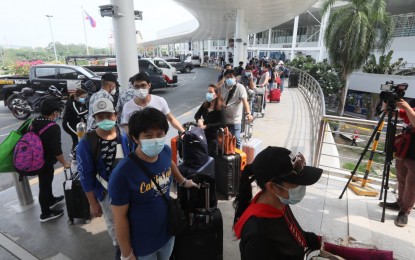
(File photo)
MANILA – The Department of Health Technical Advisory Group (DOH TAG) for Covid-19 has recommended strict implementation of quarantine protocol for returning overseas Filipino workers (OFWs) because their reverse transcription-polymerase chain reaction (RT-PCR) tests mostly yield false-negative results.
"Quarantine should be strictly enforced because whether or not testing is done for as long as quarantine can be imposed, then we continue to keep our border safe," DOH TAG member Dr. Anna Ong-Lim said on Wednesday during a meeting with President Rodrigo Duterte.
On Wednesday, Duterte expressed concern over the Department of Labor and Employment's proposal to shorten the mandated 14-day quarantine period for returning OFWs.
Ong-Lim told Duterte that TAG's recommendation is to focus on quarantine measures because "this will ensure that any entry of variants from travelers can be better controlled".
The experts preferred a 14-day quarantine but said this can be reduced to a minimum of 10 days and testing may not be needed once the isolation is completed.
Dr. Marissa Alejandria, another DOH TAG member, explained quarantine as one way to prevent the spread of the SARS-CoV-2 considering it has a pre-symptomatic characteristic.
"May tinatawag tayong phase na kahit wala pang symptom, puwede na siyang makahawa kaya that is the basis po for the 14 days. Iyong (There is a phase where it can infect other people even when there is a lack of symptoms that is the basis for 14 days. The) incubation period is five to 14 days," Alejandria said "So median of five to seven days. Ang pinaka-infectious period is 'yong (The most infectious is the) first week: five to seven days. And that was the basis of testing at the fifth day."
Control entry of 'variants of concern'
Molecular epidemiologist Dr. Edsel Salvana noted that the variants of concern have come into the country through the different returning travelers.
"The quarantine has already, you know, it really has an impact. But what our proposed solution is actually there is data that we can shorten quarantine from 14 days to 10 days provided that the person remains asymptomatic during that whole time," Salvana said.
According to data from CDC, quarantine can be reduced to 1o days from 14 days without testing and the residual transmission risk is just about one percent.
Philippine Genome Center Executive Director, Dr. Cynthia Palmes-Saloma explained that genome sequences show one case of a variant of concern can reproduce five or more cases.
"At iyan po 'yong nakikita natin dito sa mga B.1.1.7, itong UK variant at saka itong mga South African variant. Kung titingnan po natin 'yung roots nila, isa, dalawa lang makalusot, manganak na sila nang manganak (And that's what we see in the B.1.1.7, the UK variant and the South African variant. If we look at their roots, one, two entries, they'll reproduce)," Palmes-Saloma said.
Timing of testing
Palmes-Saloma stressed that testing upon the arrival of returning OFWs often yields false-negative results.
Salvana proposed testing at a later time to catch the real cases.
"Testing, even on the fifth day, will still not pick up everyone. So, it is either we test on the seventh day, or we completely do away with the testing but make sure that we quarantine everybody until the 10th day," he said.
"This can be done in facility, but again it is very expensive, or we can do this at home as long as the local government units can supervise strictly everyday," he added.
The DOH TAG experts concurred that the 14-day mandatory testing may be relaxed to 10 days provided that the returning OFWs remain asymptomatic and monitoring is strictly implemented.
Testing must be done when they get symptoms during the 10-day quarantine.
"Taking into consideration the economic burden, the physical, emotional burden that the 14-day quarantine is imposing," Alejandria said. (PNA)
